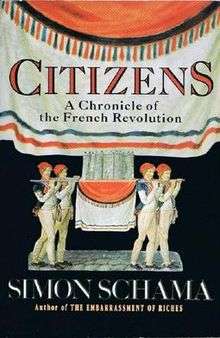Citizens: A Chronicle of the French Revolution
 | |
| Author | Simon Schama |
|---|---|
| Country | United States |
| Language | English |
| Subject | The French Revolution |
| Publisher | Random House |
Publication date | 1989 |
| Media type | Print (Hardcover) |
| ISBN | 0-679-72610-1 |
| OCLC | 20454968 |
| 944.04 20 | |
| LC Class | DC148 .S43 1990 |
Citizens: A Chronicle of the French Revolution is a book by the historian Simon Schama, published in 1989, the bicentenary of the French Revolution.
"The terror," declared Schama in the book, "was merely 1789 with a higher body count; violence ... was not just an unfortunate side effect ... it was the Revolution's source of collective energy. It was what made the Revolution revolutionary."[1] In short, “From the very beginning [...] violence was the motor of revolution.”[2] Schama considers that the French Revolutionary Wars were the logical corollary of the universalistic language of the Declaration of the Rights of Man, and of the universalistic principles of the Revolution which led to inevitable conflict with old-regime Europe.
Reception
Marxist historian Eric Hobsbawm has described the book as being "exceptionally stylish and eloquent" and "extremely well-read." Nevertheless, he considers Citizens to be, above all, a political denunciation of the revolution[3] and a continuation of a tradition in British literature and popular consciousness (established by the writings of Edmund Burke and Thomas Carlyle, reinforced by Dickens' A Tale of Two Cities and promulgated in subsequent pop literature), which has defined the Revolution foremost by the Terror.[4] In Hobsbawm's view, Schama fails to see the positive aspects of the revolution and focuses solely on the horror and suffering, presenting them as gratuitous. Hobsbawm further criticizes the book, opining that "Schama is not involved as an expert in the field, for . . . the book does not set out to add to the knowledge already available. The author's choice of a narrative focused on particular people and incidents neatly sidesteps the problems of perspectives and generalization."[3]
Reviewing the book in the journal French Politics and Society, Robert Forster of Johns Hopkins University writes that "Schama desacralized the Revolution [...] by his inimitable style and wit". Forster praises Schama's analysis of key issues and his descriptive talents, though he criticizes what he sees as Schama's overly favorable picture of the French economy and society on the eve of the revolution.[5]
In his review published in Annales historiques de la Révolution française, Youngstown State University professor Morris Slavin criticizes the lack of sympathy displayed by Schama for "the revolutionaries in the real circumstances of a profound social and political crisis", arguing that he jugdes the events from the standpoint of royalist elites. Echoing Thomas Paine's comment on Edmund Burke, Slavin remarks: "He pities the plumage, but forgets the dying bird". Slavin finds it "regrettable that such a capable historian as Schama [...] should be so prejudiced against the Revolution".[6]
References
- ↑ Doyle, p. 102.
- ↑ Schama, Simon. Citizens. Quoted in: Davies, Norman. Europe: A History. Pimlico (1997), p. 690.
- 1 2 Hobsbawm, Eric. 1990 Echoes of the Marseillaise: two centuries look back on the French Revolution. P.97
- ↑ Hobsbawm, Eric. 1990. Echoes of the Marseillaise: two centuries look back on the French Revolution. P.5
- ↑ Robert Forster (1989). "Review: Citizens: A Chronicle of the French Revolution by Simon Schama". French Politics and Society. 7 (3): 150–156 – via JSTOR. (Subscription required (help)).
- ↑ Morris Slavin (1989). "Review: Citizens: A Chronicle of the French Revolution by Simon Schama". Annales historiques de la Révolution française. 277: 297–300 – via JSTOR. (Subscription required (help)).